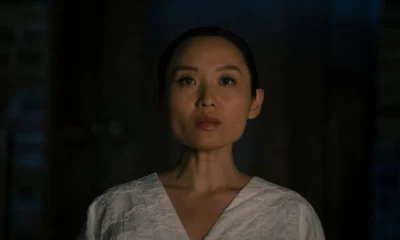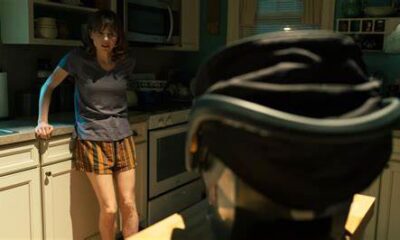
HMTL Recap and Review – Creepshow S1E4
Welcome to Haunted MTL’s ongoing coverage of Shudder’s original series, Creepshow. The last episode was a combination of one of the best installments the show had and one of the weakest, which made for a fairly strong half-hour overall because even a week Creepshow segment is good anyway. This week, however, both installments are pretty great.
“The Companion”

David Bruckner directs and Matt Venne writes an adaptation of a short story. The original short story was written by Joe, Kasey, and Keith Lansdale. It’s a family affair this week. This is Bruckner’s sixth segment of the show thus far. His highlight, however, is still “The House of the Head,” but he also directed the fantastic “The Man in the Suitcase.” Venne has written for Masters of Horror, Bag of Bones, and the 2013 sequel to Fright Night.
“The Companion” is a lean little tale that stars Logan Allen, Dylan Gage, Voltaire Council, and Afemo Omiliani. The impressive, sinister scarecrow is performed by Carey Jones, a veteran make-up and SFX talent who has had quite the resume.
The story has that certain quality that I felt was missing from last week’s “All Hallow’s Eve,” and that quality is a certain sort of meanness. The story follows a kid, Harold, on the run from his bully, who just happens to be his older brother, Billy. During his escape, Harold stumbles onto an abandoned farm and awakens a vengeful scarecrow. He later finds the corpse of the farmer, face blown off in gruesome detail, who has left behind a note telling a sad tale. It’s very much a play on that Frankenstein story of the unintended consequences of creating life, and for the most part, it works. What really sells the episode, though, is the fact that Harold learns absolutely nothing from his traumatic experience. Instead, he buys in and uses the scarecrow for vengeance.
Bottom Line
“The Companion” is pretty great. There are some choices that feel like they could have been reconsidered. The kindness of the character of Smitty, for example, feels a little wasted. He shows up, ends up being a cool kid, but then leaves and has no real effect on the story.
That being said, the usage of the comic panels to show the passage of time in the farmer’s narrative is inspired and one of the more interesting ways the comic trappings have inserted themselves into the episodes.
Plus, that scarecrow was really cool. Good stuff.
 (4 / 5)
(4 / 5)
“Lydia Lane’s Better Half”

The second segment of the evening is directed by Roxanne Benjamin. John Harrison handled the teleplay of the story which was developed by Greg Nicotero and Harrison. Roxanne Benjamin has a solid list of production credits, such as with the V/H/S franchise. Most of Benjamin’s directorial credits revolve around short-horror such as Southbound and XX, making her a great fit for Creepshow. Harrison and Nicotero, of course, are horror veterans who need no further introduction.
The episode, which plays out like the most messed up take on Weekend at Bernie’s ever, is anchored by the incomparable Tricia Helfer as the titular Lydia Layne. Helfer holds her own in what is, in many ways, a one-woman morality play with Danielle Lyn spending the majority of her appearance as a vengeful corpse.
“Lydia Lane’s Better Half” is wonderfully dark and grimy in tone, not texture. Visually there is a wonderful cinematic polish to the episode. Neither Lydia or the soon-to-be-dead Celia are good people and the episode is a series of escalations and terrible ideas that play out as you would expect. Creepshow segments are at their best on a small scale, and “Lydia Lane’s Better Half” is a prime example of this. Most of the story takes place in an elevator, stuck in the aftermath of an earthquake. It’s wonderfully screwed up, forcing Lydia to directly confront her actions. Meanwhile, Danielle Lynn, as the corpse of Celia, proves to be a powerful performer with just dead-body language and accusatory stares alone.
The show also has an absolutely fantastic head injury. One for the ages.
Bottom Line
“Lydia Lane’s Better Half” is a strong contender for an iconic segment in this series so far. It’s just mean, mean, mean, and filled with terrible decisions that play out about as well as you’d expect. It also feels the most thoroughly modern of the segments thus far, dealing with themes of finances, same-sex relationships, and even a completely unintentional but timely Hong Kong mention. Some of the segments have clearly been contemporary, but this one just feels a little more timely than those.
 (4 / 5)
(4 / 5)
The Creep Factor

We don’t get to spend a whole lot of time with the Creep this week. But we do get a rather infectious laugh from the Creep as they read a magazine.
Actually, what gender is the Creep, anyway?
We do get a neat little bonus in “The Companion” as a Creepshow comic works its way into the frame, and the Creep also finds a way to observe the ending of that same segment, first-hand, lurking right outside the window.
We hope that you enjoyed our coverage of the first installment of Shudder’s Creepshow. Creepshow will air on Thursdays around 9 PM EST on Shudder. Haunted MTL will be covering the whole 6 episodes of the first season.
Movies n TV
Wheel of Time A Question of Crimson Is a Political Espionage Delight
Episode two of Wheel of Time felt like the beginning of a long journey. Stories are unfolding, lives are changing, and blood is spilling.
Let’s discuss.
The story
We begin this episode in the past with Elayne’s mother, Queen Morgase. It turns out her rise to the throne was a bit, shall we say, cutthroat. So when she shows up at the White Tower, Siuan is concerned.
She might have reason to be, too.
Meanwhile, Rand, Egwene, Moiraine, Lan and Aviendha are in the Spine of The World. As they travel through some of the most breathtaking lands I have ever seen on a TV show, Egwene is plagued with nightmares. We think at first that’s just her trauma working itself through her system. But we soon find out that it might not be that straightforward.
Finally, Perrin returns home to heal after his hand is almost cut in half. But when he gets there he finds the town has been infested by Children of The Light. And they’re looking for him.
What worked
There was something heartwarming in this episode about political espionage and choking religious persecution. And that is Elayne’s relationship with her family.
I have consumed a lot of fantasy content with royal families. And I have never once heard a princess call her mother ‘Mum’. I’ve never seen royal siblings get along. And I have sure as hell never seen a princess have a good relationship with her step-parent.
This was refreshing. Even though Queen Morgase is kind of a horrible person she seems like a good mother. And that’s an unexpected delight.

Of course, this is just one storyline among many. And while this can sometimes be overwhelming, in this case it wasn’t.
I’ll be honest, some of these storylines are going to drag for me. I know this because I’ve read some of the Wheel of Time books and I have an idea that not all the characters exactly pique my interest.
No one likes all the characters. No one likes all the storylines. While I am here for the political espionage between Queen Morgase and Siuan, not everyone likes it. While others might be fascinated with Selene trying to win Rand back, I couldn’t care less.
Having multiple storylines keeps everyone’s attention better. So long as things don’t get out of hand. Things can easily get out of hand. But this seems to be managed well.
So far.
What didn’t work
As I mentioned above, I’m not thrilled with Rand’s story at this point. And while it’s fine to not like a storyline when there are this many to choose from, it’s not fantastic that the one I like the least is the one involving our two main characters. And anytime we were with the team at the Spine of The World, the only thing that brought me joy was Moirain’s hat. It reminded me of Stockard Channing’s hat in Practical Magic.
The problem is that Rand is Charlie Brown with controversial magical powers. He is boring, serious, and pessimistic.
And yes, I understand that he has a heavy emotional burden and he’s the Dragon Reborn and that’s quite taxing and all. But let’s be fair, there isn’t a single person in this show that doesn’t have a heavy burden. And most of them manage to be fun occasionally.

All that being said, this episode of Wheel of Time did exactly what it needed to do. It set up conflicts at each of the three locations. It established emotional ties between the characters and the events. And it established goals for everyone.
This was, in short, a solid episode. Not groundbreaking, not mind-blowing or life changing. It was simply good. It was entertaining and moved the plot forward.
Well done.
 (3.5 / 5)
(3.5 / 5)
Movies n TV
Wheel of Time Returns With A Bang
Wheel of Time is back for season three. There are mixed feelings regarding this. Last season, there were some serious pacing issues. And some serious sticking to the book’s storyline issues. But we’re two seasons in, and we don’t give up so easily. So let’s dive into episode one, To Race the Shadow.
By the way, I highly recommend watching this episode with the subtitles on. You’ll see why.
The story
We begin this episode with Liandrin facing a trial of sorts for her rampant betrayal. She does her best to gaslight her Aes Sedai sisters into thinking that Siuan Sanche is the real traitor.

When that doesn’t work, she reveals how many Black Aes Sedai have actually infiltrated the tower.
Spoiler, it’s a lot.
In the aftermath, our whole team gathers to drink and enjoy one night of relaxation before they head out to the Tear to form an army for Rand. All is going well until they’re attacked by myriad creatures and a sentient axe.
What worked
This episode was long. It had a run time of an hour and eleven minutes. And a lot of that run time was spent in heavy dialog scenes.
Fortunately, these were well-done scenes.
If you’re going to have a lot of talking scenes, there are good ways and bad ways to do it. Last season, we saw lots of examples of the bad way to do it. But this episode did it well. For one thing, other things were going on while conversations were taking place. The characters are drinking, playing games, walking through an interesting city. And the scenes themselves didn’t stretch out. They weren’t repetitive. We heard what the character had to say, then we moved on.
It was also nice that the point of these scenes wasn’t just info dumps. We had character development. We had romantic interactions. We had plot development and foreshadowing.
Overall, this episode felt like what it was. A moment of calm before a storm.
Taking a step back, I’d be remiss if I didn’t address the fight scene at the start of the episode. Because it was epic.
The magic looked amazing. The martial arts that went along with it looked fantastic. The costumes were beautiful. It was just incredibly fun to watch.
More than that, it was emotional. We lost some characters in that fight that were important. And it was clearly emotionally shattering for many of our characters, who found themselves betrayed by people they trusted.
So many of them.
It was a great way to open the season.
What didn’t work
Despite that, this episode wasn’t without its flaws.
First off, there were a lot of dialog scenes. And they were good scenes, as I’ve already discussed. But it was one after another after another. And when your episode is, again, an hour and eleven minutes, it’s maybe a little much to have so much chit-chat. Couldn’t some of these conversations, important as they were, have been moved to maybe another episode?
Finally, I want to talk about Egwene’s travel through the arches.

I feel like maybe there were some deleted scenes here. Because there must have been more to that visit than what we saw, right?
We could have seen Egwene battle Rand. That would have been badass and emotionally devastating. We could have seen her with a quiet life with Rand back home at the Two Rivers. We could have seen anything except for the quick clip of Rand in a bloody river, followed by Egwene being shoved back out in a bloody shift.
Bad job. But at least it wasn’t an extended scene of Moiraine collecting bathwater, and then taking a bath while looking sad. If we’d started this season with another scene like that, it might have broken my brain.
Amazon dropped the first three episodes at once. So we’ll be back soon to talk about episode two. See you then.
 (4 / 5)
(4 / 5)
Movies n TV
Entertaining as hell: Eight Legged Freaks (2002) Review
Early 2000s is a special era for the industry. It accepts the cheesiness and corniness of movie making, in turn producing some gems in their own right. Eight Legged Freaks starring David Arquette and young Scarlet Johanson is a horror comedy about giant spiders who overtake a small town. As crazy as that premise sounds, the movie surprisingly has a ton of heart and is super entertaining. Let’s review, shall we?
Plot
We start Eight Legged Freaks with a shot of toxic waste spilling into the water supply of Joshua, a spider farm owner. He is friends with Mike, one of our protagonists, who is a science geek and a spider enthusiast. Mike notices something quite right upon visiting Joshua, but no one takes him seriously. We are then introduced to the rest of the crew. Mike’s mother Samantha, the town sheriff, is too busy chasing Ashley, his sister, who is dating the town mayor’s son Bret (something Samantha does not approve of). We also have Chris, who returns to the town to save his father’s legacy in the town mines. He has opposition from Wade, Bret’s father, who wants to use the mines for his business ventures. Lots of drama going on that will only get juicier once the spiders get loose.
The creepy crawlies quickly dispose of Joshua and make their grand appearance after Ashley rejects Bret’s advances, abandoning him in the middle of a desert. A glorious chase sequence ensues as the spiders make their way towards the town, wreaking havoc on its residents. In a true horror fashion (which the movie acknowledges), it takes some convincing from Mike and then from Samantha for the town to take the threat seriously. The tongue-in-cheek style of narrative adds the comedy aspect to a movie that would otherwise burn out fairly quickly.
The remaining characters hide out in a shopping mall as it’s the only somewhat sturdy building in the area. This doesn’t last long as the spiders break in, forcing them to run through the mines. Their resources to fight the creepy crawlies off are limited as the methane gas doesn’t allow them to use firearms. Such conditions require resourceful thinking from Chris, who uses perfume to fend off the leader of the spider group and save himself during the climax of the movie.
Character dynamics are not forgotten once the action kicks in. We have Chris confessing his long-term feelings for Samantha which she knew all along, which provided some comedic relief. Bret also reunites with Ashley and apologises for being an asshole. Mike finally gets the appreciation he deserves as his knowledge saves the townsfolk more than once during the whole ordeal.
We end the movie with the town’s radio show person telling the story as an urban legend during his segment. This brings it into question – how much of it happened the way he said it did? We can only guess…
Overall thoughts
Eight Legged Freaks is a fun creature feature with some self-aware commentary on genre tropes that doesn’t take itself too seriously. The acting is good, the pacing fitting and the characters are likeable enough for you to want them to make it through. Definitely a must watch, if you don’t suffer from arachnophobia, that is.
 (5 / 5)
(5 / 5)













